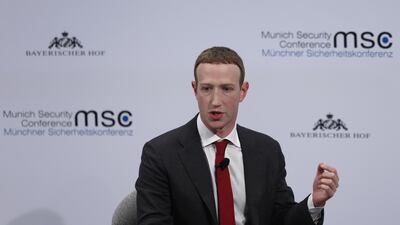Mark Zuckerberg revealed that Iran was behind the most recent disinformation threats removed from the Facebook platform, adding that the perpetrators were targeting the US.
The founder of Facebook said it had tackled 50 information operations targeting elections in other countries and then listed one in Russia targeting Ukraine and one in Iran targeting America, where the 2020 election race is getting under way with the first primary votes.
The chief executive appeared at the Munich Security Forum where he also revealed that the social media platform has 35,000 people working on content and security review procedures, focused on 20 categories of violations ranging from hate speech to terror propaganda.
More than one million fake accounts were being removed from Facebook every day.
“We need to stay vigilant,” he said. “The adversaries are also improving.”
The Facebook founder says he wants state regulation on social media’s roles in elections, content, privacy and data portability.
The entrepreneur said threats were evolving in a few big ways. Increasingly there is a domestic threat of parties co-opting the tactics of foreign interference.
“AI systems get better, we are generally catching more of the hate speech,” he told the audience of politicians and security specialists. “In an area where we do quite well 99 per cent of ISIS propaganda etc that we take down, our AI identifies it before anyone sees it,” Mr Zuckerberg said.
“Overall the message is there will be new types of threats in the future and we have to stay on top of it.”


